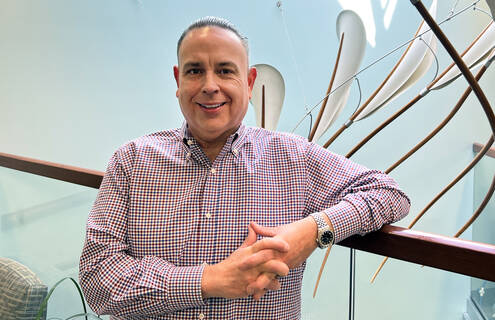
Everything just fell in place. This was an easy treatment—all the way to my ultimate cure.
David Streeter, Cheshire Medical Center patient“I think there is a stigma for some people, and for many, it’s just something they don't really want to do—who would?” says Cheshire Medical Center patient David Streeter. He’s referring to colorectal cancer screening, specifically a colonoscopy, which was prescribed by his primary care provider. “Now, looking back at what we’ve learned, I'm so happy I did it. This was an early detection, and now I'm 100 percent cancer free.”
Every year about 150,000 Americans are diagnosed with colorectal cancer, or CRC, and more than 50,000 die from it, according to the Colorectal Cancer Alliance. CRC is the second most common cause of cancer death globally, leading to almost 1 million deaths per year. This is despite the fact that screening techniques like colonoscopies reduce the number of deaths from this disease. Colorectal Cancer Awareness Month is observed in March to highlight the importance of screening for CRC.
“For decades, the guidance has been to do initial screenings at age 50,” says Andrew Gorske, MD, department chair of Gastroenterology at Cheshire, who conducted Streeter’s colonoscopy. “But this past year, that changed to age 45, with good evidence to support it. Research has shown an uptick in individuals at a younger age developing colon polyps and cancer, so 45 is the new 50.”
“When my doctor recommended a colonoscopy, I scheduled it without hesitation,” says Streeter, a 51-year-old Keene native who recently moved back here from New Jersey. “I like to stay on top of things. It was easy and practically painless.” The screening revealed polyps, one of which was concerning to Dr. Gorske. When it was analyzed, it was indeed cancerous.
“This is my second bout with cancer, believe it or not,” says Streeter, who previously underwent treatment for a different cancer while living in New Jersey. “But this time I was home, and I knew I was going to have the support of family and friends. When I got the news, I knew right off that I had beaten this before, and I was going to do it again.”
Colon cancer doesn't just appear out of nowhere. The process of small, innocuous-looking growths, or polyps, becoming cancer takes months if not years. Research has shown an uptick in individuals at a younger age developing colon polyps and cancer, so 45 is the new 50.
Andrew Gorske, MD, department chair of Gastroenterology at Cheshire Medical Center
Streeter discussed different treatment options with his doctors at Cheshire, such as surgery close-to-home with Cheshire’s colorectal specialist, Olivier Van Houtte, MD. He ultimately opted to go to Dartmouth Hitchcock Medical Center in Lebanon for an outpatient robotic surgical procedure. Everything fell into place seamlessly, and within 6 weeks of being diagnosed, he was confirmed cancer free.
“Everything just fell in place,” says Streeter. “This was an easy treatment, and all the way to my ultimate cure.”
Streeter was fortunate to have discovered his CRC when he did. Although there are risk factors and common symptoms to be aware of—such as abdominal pains, changes in regularity, or bloody stools—colorectal cancer can develop without any symptoms at all. Screening is the best way to prevent or detect the disease early in its development when it's most treatable.
“Colon cancer doesn't just appear out of nowhere. The process of small, innocuous-looking growths, or polyps, becoming cancer takes months if not years,” Gorske says. “If you have an opportunity to find them when they're small and can be removed easily, then you have intervened in that process.” Although not all polyps will develop into cancer, they are all removed as a precaution.
Gorske recognizes there are other, less-invasive stool tests out there, such as Cologuard, and that these have improved over the years. These tests are designed to detect the presence of microscopic amounts of blood or abnormal DNA that may indicate the presence of cancer. But these tests are less sensitive to detecting smaller polyps, which is where colonoscopies excel.
“Some people aren't too keen on having a colonoscopy, so we also have this non-invasive option,” Gorske says. “There is some value in doing stool-based tests, but the advantage to having a colonoscopy is that we can find smaller polyps when they're easy to remove—often within the same procedure.”
Streeter was also very fortunate to have had his screening at Cheshire, a member of Dartmouth Health. Dartmouth Cancer Center is one of the original National Cancer Institute-designated centers, providing access to many specialists, surgeons, techniques, and procedures.
“We have access to data specialists, research protocols, and more,” Gorske says. “It's so much bigger than just gastroenterology at Cheshire, if patients need different levels of care. Being a Dartmouth Health member means that even here at Cheshire we're really on the cutting edge, in terms of the care we provide.”
“One of the highlights at Cheshire is all the caring nurses and doctors,” Streeter says. “I have a sense of humor, and that's how I kind of deal with things. I like to crack jokes, and I found that they were right there with me. I felt so comfortable. They just really put me at ease going through what may be considered a difficult process for some. I found it to be quite easy for me.”
Streeter’s experience has also made him an advocate for others to follow his example.
“I recommend everyone speak with their healthcare professionals about colorectal cancer screening,” he says. “My advice is don't wait to book the appointment. Early detection is a big factor. I feel it saved my life and it definitely will save others as well.”
Ask your primary care provider for a referral if you are over the age of 45 and haven't been screened for colorectal cancer in the last 10 years.